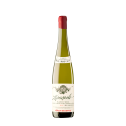Monopole Classic Gran Reserva
Years ago we rescued from the past our classic Monopole, made the old fashioned way. The first vintage of this remake was 2014. Part of the fruit was cut in our vineyard in Villalba de Rioja, vinified as the Monopole Classic, and aged in barrel for almost 5 years.
A gran reserva totally sui generis.
LIMITED UNITS
Characteristics of the vineyard
The grapes come from our own vineyard located in the municipality of Villalba, a high altitude village sheltered by the Obarenes Mountains. The vines are pruned on trellises for protection, due to the prevailing wind on the estate. Altitude above 600 meters.
The estate is called La Plana and despite its name it is on a slope with eastern exposure, a dry vineyard with predominantly sandy soil that filters the water well in this hillside area, maintaining the plant with a slight water stress and obtaining loose bunches of small, tasty grapes.
All the work in this vineyard, including the harvest, is done by hand.
Winemaking characteristics
Once the grapes have ripened, they are harvested in boxes, taking advantage of the low temperatures early in the morning to avoid possible oxidation. The boxes are kept in cold storage for 24 hours to preserve aromas.
The yield of this vineyard is very small, hence the small amount of wine produced, which is gently pressed in a small hydraulic press and fermented in used 400L barrels and 500L casks.
The wine has been aged for five years in three used Riojan barrels and two more used Sanlúcar barrels.
The wine has not been clarified since, as in the past, the long aging in barrels has stabilized and cleaned the wine in a natural way.
The care taken in the vineyard, quality raw material and traditional winemaking result in this special wine of great complexity.
Harvest data
The 2017 harvest was marked by the drought and frosts that affected much of western Europe, including the Iberian Peninsula and with repercussions in all markets.
In Rioja we began the year with higher temperatures than usual, which led to an early vegetative cycle, which in turn was decisive for a frost suffered in the early hours of April 28 to affect production already depleted by the drought.





